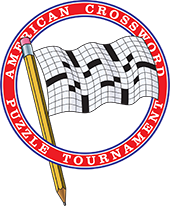Camaraderie, not cross words, is the exchange among these foes
Source: Boston GlobeDate: March 3, 2002
Byline: Clea Simon, Globe Correspondent
Camaraderie, not cross words, is the exchange among these foes
When the contestants take their places, sitting at the long tables that will fill the ballroom of the Stamford, Conn., Marriott starting Friday, March 15, a seven-letter word for strain, nervousness, pressure, anxiety — starting with T — will be what springs to most observers' minds.Tension.
But for the roughly 400 people who take their turns over March 15-17, the 25th annual American Crossword Puzzle Tournament will be more than a series of timed matches or a shot at the 20 prizes. The oldest and largest event of its kind, the three-day tournament was conceived by the hotel's marketing department originally as a way to drum up business during a slow month. Now it has become a social event of the highest order: a meeting of puzzle-loving minds, hosted by Will Shortz, the New York Times puzzle editor and provider of puzzles for National Public Radio's Weekend Edition Sunday show since 1987.
"Crosswords are usually a solitary activity," says Shortz, "but I love the people who are at the tournament. They're intelligent, clever, funny, well-read. If you strip away the common interest in puzzles, they're just interesting people."
For longtime gamester Jay Kasofsky, of Woodridge, N.Y., the social aspect has gained the ascendancy over the years. "I do crossword puzzles all the time, and I enjoy the camaraderie of other people who do crossword puzzles. I used to enjoy the competitive aspect when I was younger. I was much quicker then," says Kasofsky, a retired high school history teacher who has attended every tournament.
Crossword aficionados are indeed a smart and friendly bunch, he and his fellow attendees are quick to relate. "I went my first year not knowing anyone who would be there," says Amy Andersen of Maynard, who will be attending for her third time. She's been doing the puzzles since she was a child, she says, and found out about the tournament on one of the Times's crossword puzzle forums (at www.nytimes.com). At her first tournament, she ended up dining with some fellow forum contributors. The highlight for her, however, was meeting the authors of many of the puzzles, which run daily in the paper, increasing in difficulty all week, culminating on Sunday. "It was like being in a room with my favorite authors. I'd been doing their puzzles for years. It was a lot of fun."
Of course, any tournament is going to be more than just a social event, and crossword puzzlers are tough-minded competitors as well. Although the tournament is open to all, with a special class for rookies as well as categories for different age groups, competitive levels, and regions, most of those who attend know their puns, wordplay, and vocabulary. Each round with the Times-sized puzzles, 15 boxes across by 15 tall, is timed, with players getting from 15 to 45 minutes depending on the difficulty of the puzzle.
Accuracy is paramount, Shortz says, but speed counts, too, and contestants get bonus points for each minute under the time limit that they finish. (They raise their hands to signal to a referee, who picks up their papers.)
As puzzle regulars will know, the game clues and words draw from a wide variety of topics, including popular culture and news of the day. One thing absent will be what Shortz calls "crosswordese," that is, words that appear almost exclusively in crossword puzzles. He offered the example of "anoa," the name of a Celebes ox. "You could spend a lifetime reading National Geographics and maybe see this word once," he scoffs.
By eliminating such arcane language and adding more timely words, Shortz has broadened readership of the Times puzzle since he took over in 1993, and the tournament reflects this expansion, with players ranging from their teens to their 80s.
The best of these players will face off the morning of Sunday the 17th, with the three top players in each division competing in sudden-death heats on the ballroom's stage and playing on giant boards visible to all. The winner will walk away with the grand prize of $1,500 and an unabridged dictionary, to be awarded at the luncheon that follows. All participants, Shortz says, will come away with a refreshed, if not enlarged, mind.
Crosswords "lead you into every field of human knowledge," says Shortz, who began creating puzzles at age 9. "They never get boring, there's always something to learn. Absolutely anything can appear in a crossword puzzle."
Clea Simon is a freelance writer who lives in Cambridge.

